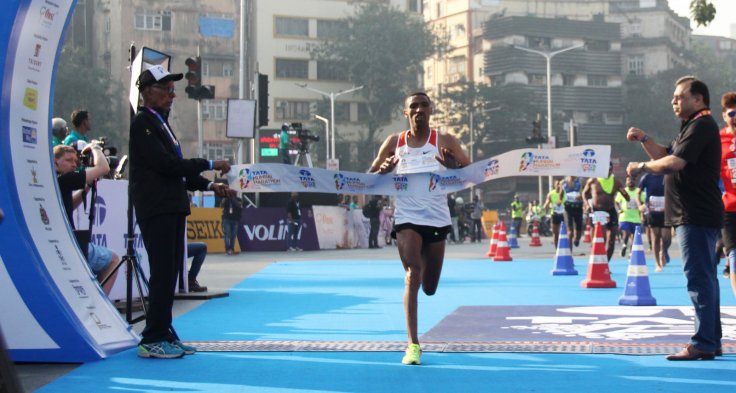
It was a double triumph for the Ethiopian runners as Solomon Deksisa and AmaneGobena took the honours at the Tata Mumbai Marathon 2018, winning in 2:09:34 and 2:25:49 respectively on Sunday.
Indian elite men men GopiThonakal and his army rival Nitendra Singh Rawat, finished just outside the top ten in 11th and 12th places, respectively. Gopi T inched ahead of his arch- rival Nitendra in the last stretch clocking 2:16:51. SrinuBugatha was the third-best Indian male finisher much farther down in 2:23:56. The top three Indian women finishers were Sudha Singh (2:48:32), JyotiGawte (2:50:47) and ParulChowdhary (2:50:47).
Deksisa, the fastest man in the field, arrived in the Indian city as the pundits' preferred choice for the men's race, based on his career best of 2:06:22 set at the 2016 Rotterdam Marathon.
Nevertheless, after some solid rather than spectacular performances in the last 12 months, he was a marginal rather than prohibitive favourite. The questions over whether Deksisa could win the first marathon of his career and walk away with the US$42,000 first prize continued through the first half of the race, the gun having gone at 0710 local time just as the sun was starting to rise and the temperature already 22 degrees Celsius.
Deksisa notably stayed at the back of the leading pack, avoided dictating the pace and the expression on his face on a number of occasions suggested that he was struggling to find his rhythm although he later said that this was a false impression.
"With pacemakers, I saw no reason to do anything other than stay at the back of the leading pack and I was always comfortable," commented Deksisa.
After a fast first 10km, the pace eased up and a leading group of 11 men went through the halfway point in 64:28, about 30 seconds slower than had been requested from the pacers, The pace continued to drift away from that required to improve on Gideon Kipketer's 2016 course record of 2:08:35 until Joshua Kipkorir surged at 26km.
"The pacers couldn't do the job they were asked to do and were dropping out early, so I tried to make the race quicker," said Kipkorir.
The Kenyan, second in the Mumbai Marathon 12 months ago, kept pushing hard over the next nine kilometres and the leading group had been whittled down to three by 35km: Kipkorir, Deksisa and his Ethiopian compatriot ShumetAkalnaw.
However, shortly afterwards, Deksisa threw down the gauntlet and started to go through the gears.
He quickly put a 40-metre gap between himself and Akalnaw, with Kipkorir drifting further back.
Despite Akalnaw clawing back the deficit on Deksisa to perhaps 15 metres with three kilometres to go that was to be the order they finished in.
Deksisa crossed the line 27 seconds ahead of Akalnaw, the latter finishing in a big personal best of 2:10:00 with Kipketer third in 2:10:30.
"The competition was good it wasn't too hard although the last five kilometres were difficult. I was nervous over the last 700 metres as there were twists at the finish and I didn't know the course. I was worried Shumet might be gaining on me," reflected Deksisa, who added that his sharp acceleration at 36km was all part of a pre-race plan.
Gobena, now 35, made up for the disappointment of missing out on selection for the IAAF World Championships last summer by winning her first marathon in three years and taking her over career record to eight wins from 22 starts over the classic distance.
A four-strong group – Gobena, Kenya's defending champion BornesKitur, and the Ethiopain pair of ShukoGenemo and Birke Debele – helped by a male pacemaker went through the halfway point in a surprisingly quick 1:12:27 to give rise to some speculation that the impressive women's course record of 2:24:33 by Kenya's Valentine Kipketer in 2013 might be under threat.
Shortly after 21km, Kitur started to push hard and soon found she only had Gobena for company.
The pair, still with the Kenyan pacemaker Bernard Soi in attendance, stayed together until 31km when Kitur then started to struggle with the relentless pace and left her Ethiopian rival out on her own.
Gobena then focussed on her task and produced an impressive exhibition of solo running and although she tired slightly over the final three kilometres the Ethiopian still came home in the second fastest winning time in the history of the Mumbai Marathon, which this year celebrated its 15th edition.
Kitur came home second in 2:28:48, a personal best by 13 seconds – claiming her third successive year on the Tata Mumbai Marathon podium after second in 2016 and winning last year – while Genemo was third in 2:29:41.
On winning the race, Gopi said, "I did not do anything different in terms of my practice, I just trained more. I would like to thank my coach, the Athletics Federation of India and ASI Pune for supporting me to come forward and run for this marathon." He added on his performance. "The first 30kms were fine, but in the last 12kms my pace reduced which affected my finish time"
In the Full Marathon Indian Women's Elite category, Sudha Singh completed the full marathon in 02:48:32, she said. "My pace in the first 21km for a finishing of 02:33:00 was good, but post that I started getting cramps and found it very difficult to run. But, I was determined to complete the race and not give up. The weather was very warm, and I have practised in cooler weather conditions. That played a major role in my finish timing."
The Tata Mumbai Marathon 2018, an IAAF Silver Label Road Race, has a total prize fund of US$405,000 this year.
Approximately 44,000 runners took to the roads in Mumbai for six different races over varying distance in what has become an annual event in the city on the third Sunday of January and one of Asia's biggest mass-participation running events.









